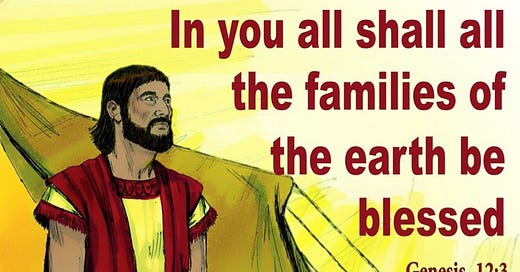The Bible, with its intricate web of stories, prophecies, and teachings, is a vast repository of spiritual and moral guidance for billions. One of the many verses that has garnered significant attention, particularly in contemporary geopolitics, is the promise made to Abraham in Genesis 12:3: “I will bless those who bless you, and whoever curses you I will curse; and all peoples on earth will be blessed through you.” This has been interpreted by some as a divine endorsement for the modern state of Israel. However, to truly grasp its meaning, we must look deeper into the historical, literary, and spiritual context of the Bible. Through this exploration, it becomes clear that this verse is not a carte blanche approval for any state or political entity but a broader spiritual covenant.
1. Historical and Literary Context
To begin with, Genesis 12:3 is a promise made specifically to Abraham. It was a personal covenant between God and Abraham, assuring him of God's favor and protection, and that through his lineage, all nations would be blessed. This blessing is not tied to a specific geographical state but rather the spiritual lineage of Abraham, which includes Jews, Christians, and Muslims.
Furthermore, throughout the Old Testament, Israel as a people faced divine consequences for their actions. The Babylonian exile, for instance, was portrayed as a result of Israel’s disobedience to God (2 Kings 24:20). If the verse from Genesis was a straightforward endorsement of Israel as a state, irrespective of its actions, such divine punishments would contradict that interpretation.
2. The Spiritual Essence of "Israel"
In the Bible, "Israel" isn't just a geographical or political entity. It represents the community of those who wrestle with God, as Jacob did when he was renamed Israel (Genesis 32:28). This "wrestling" implies a relationship with God based on faith, struggles, and transformation.
In the New Testament, Paul expands on the concept of Israel. In Romans 9:6-8, he writes: “For not all who are descended from Israel belong to Israel... It is not the children of the flesh who are the children of God, but the children of the promise.” This emphasizes a spiritual Israel, which is not defined by ethnic or national lines but by faith in God’s promise.
3. The Prophetic Tradition: A Call for Justice and Righteousness
The prophets, from Isaiah to Micah, consistently called Israel to uphold justice, righteousness, and mercy. When the nation deviated from these values, they faced critique. Amos 5:24 proclaims, “But let justice roll on like a river, righteousness like a never-failing stream!” The prophets didn't blindly support Israel; they held the nation accountable to God's standards.
4. Jesus and the New Israel
Jesus’ teachings provide another layer of understanding. In Matthew 21:43, Jesus says, “Therefore I tell you that the kingdom of God will be taken away from you and given to a people who will produce its fruit.” Here, the spiritual mantle of Israel is envisioned as passing to those who uphold the values of the Kingdom of God, irrespective of ethnicity or nationality.
5. Historical Narratives and Their Implications
Throughout history, various empires and groups have used religious texts to justify their actions, from the Crusaders to various colonial powers. The danger lies in taking scriptures out of context to endorse present-day political entities or actions. While the modern state of Israel has a legitimate right to exist and defend its citizens, like all nations, it should not be exempt from critique when its policies might conflict with broader biblical values of justice, love, and peace.
Conclusion
The Bible's depth and complexity defy simplistic interpretations. While Genesis 12:3 promises blessings to those who bless Abraham and his descendants, it is a spiritual promise rooted in faithfulness to God, not an uncritical endorsement of any state, including modern Israel. As with all scriptures, context is paramount. The Bible envisions an Israel defined by faith, justice, and righteousness, values that transcend geographic boundaries and political entities. To understand this is to appreciate the profound universality of the biblical message, which calls all people, not just one nation or state, to a higher moral and spiritual standard.




